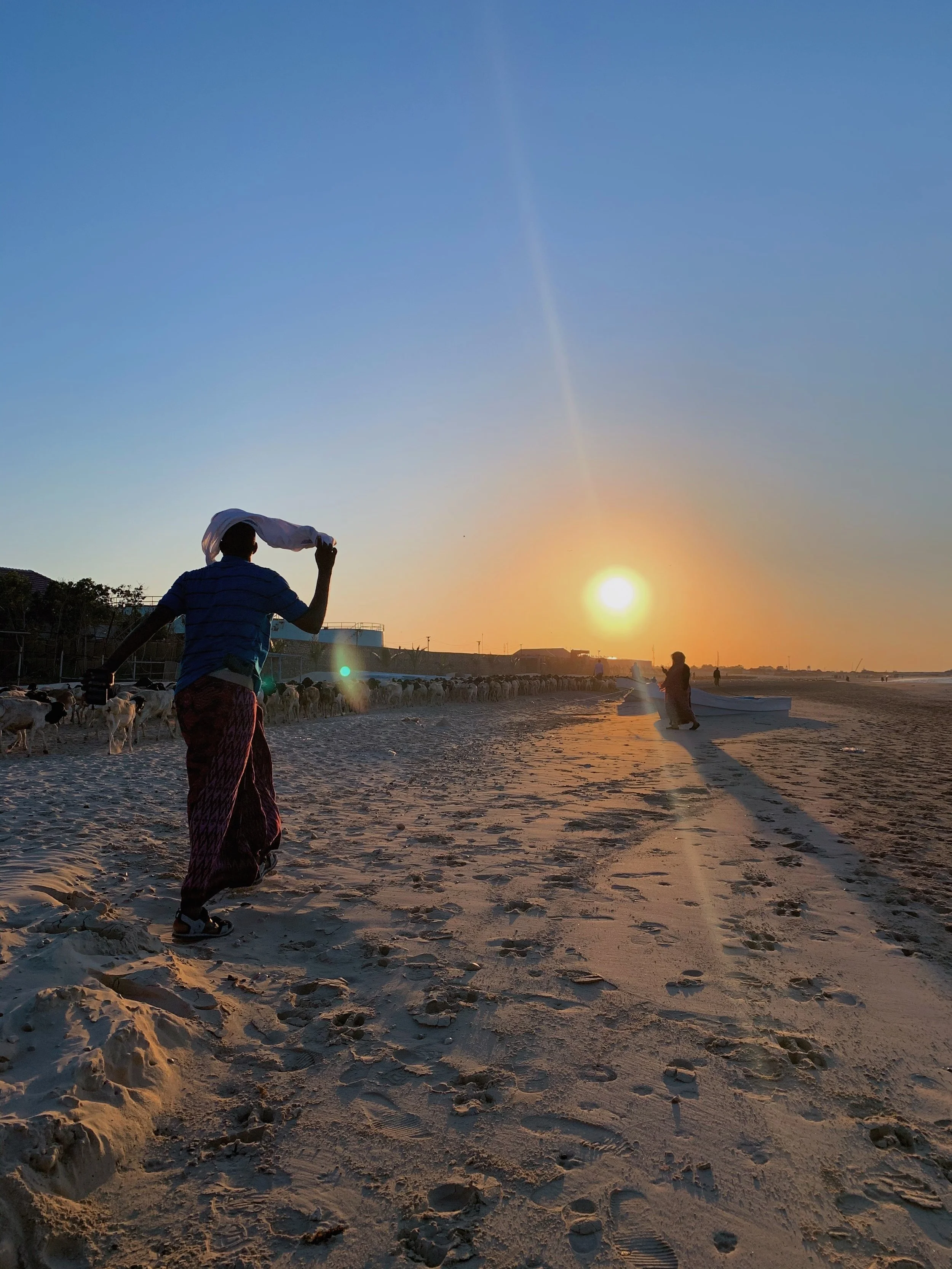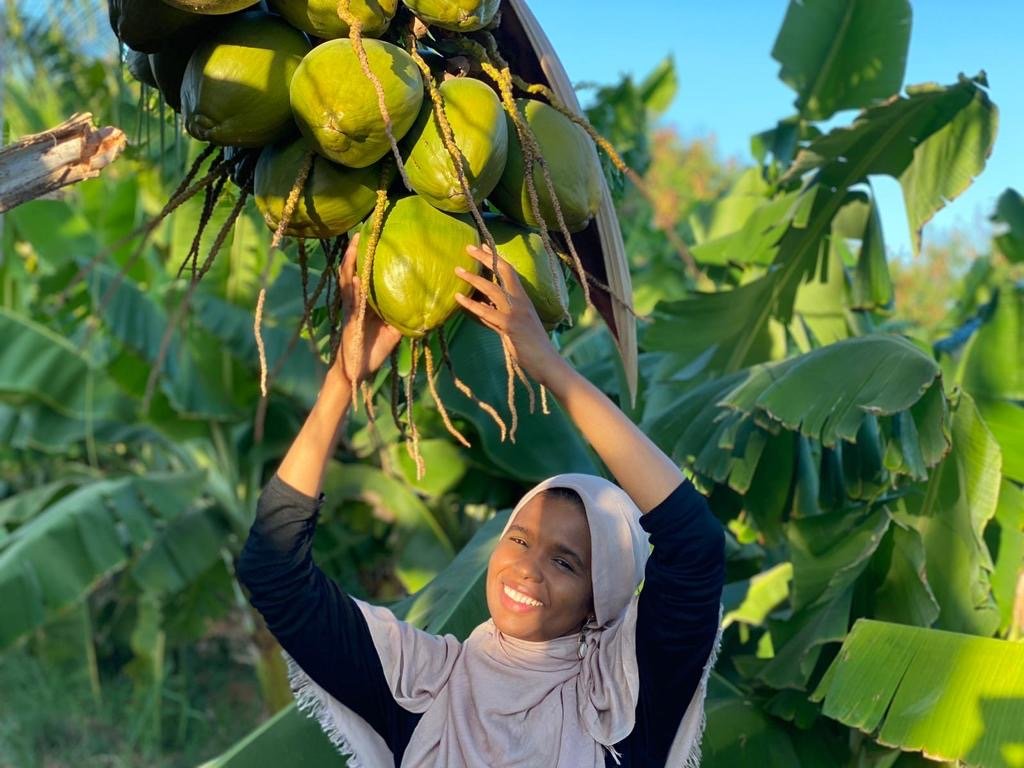Editorial: The Beauty in Daddy Issues
Photographer Shukri Carabey traveled back to Somalia to reconnect with her biological father but found something much more profound: a connection with herself and new families in friendship and love.
Text: Shukri Carabey
Photography: Shukri Carabey
November 25, 2021
It seems to me that questions of identity often arise from a certain absence of connection with ourselves, but also an absence of connection with those who have an early impact on our self image: our parents, our community. I was raised by a strong Somali single mother. This naturally influenced my identity. I feel like the result was my identity not being something I chose – it was the lack of belonging that chose an identity for me.
How can I heal from a relationship I never had?
It’s a question that leads the work of Shukri Carabey, artist, photographer, and part time model. A 26-year-young woman, a survivor or struggling survivor of something that is in slang called “daddy issues”. And by “daddy issues”, I mean both my personal journey and the challenges the diaspora community faces.
Five years ago, I took a journal and wrote down a long list of all the things I wanted to achieve and the relationships I wanted to take control of. Then I made sure I embodied certain values and qualities. I wrote: I am kind and compassionate, and will practice kindness and compassion. I wrote: I will value my mental health and build honest and raw relationships with my family. Then I started practising that in real life.
Well, let me tell you, it was a whole journey. A literal journey.
In May 2018, I decided to pack all of my essentials into a suitcase and backpack, and leave Helsinki to travel to Somalia without a return ticket. Aside from wanting to build a connection with my biological father and to break the cycle of hurt, misunderstanding, and loss, I also wanted to connect with myself and my place of origin. I wanted to heal from childhood conditioning, the trauma of absent parents, and my physical body from past eating disorders. For two years I traveled around, to Garowe, Hargeysa, Burco, Mogadishu, Berbera and Galkacyo, and it changed me in so many ways. On my journey, I discovered even more subconscious beliefs that had created certain patterns in my life than I originally thought there were.
The trip was beautiful when I look at it now, but the truth is that during my first few months in Somalia, I developed depression. I was alone most of the time, and when I wasn’t alone I was surrounded by my father and his family that I didn’t click with so much. This was because we were shaped by different environments. It was hard for me to relate to them, and for them to relate to me.
I felt shame. I was almost on the other side of the world, and still feeling the same things: not being worthy of love, thinking I can’t ask for help, always having to be strong. There were thoughts of buying a ticket back home, but I somehow kept going. After a few months of staying in my room, and occasionally socializing with never-before-seen family members, I woke up one morning feeling more “normal” and happy. Excited about the day.
I got out of the house and started meeting beautiful people. My first diaspora friend was Maz. She was brave and social, so naturally she already had a lot of friends that became my friends, too. Within those friends I found my own little clique – you know who you are.
I went from being the outsider diaspora kid who always hangs out in her room to having my own schedules and my own friends that later became like family.
Many things started changing for the better, but in conversations with my friends I realised that there was one relationship that hadn’t changed at all: the one with my father. I had forcefully and desperately tried to build a relationship with my father and his family. At one point I realised that it felt completely one sided, but I didn’t want to go back to Finland with a failed attempt. Still, the harsh truth was that I was being taken for granted and none of them wanted a genuine relationship with me. I realised that maybe the absence of my father and his family wasn’t just because we didn’t live on the same continent, but because they chose not to make any effort.
With understanding this came acceptance, after twenty something years of anger issues and disappointments. Me and my father have different meanings for family and that’s ok. I’m grateful to my father. Because of him I made this trip, because of him I learned how to voice myself without being aggressive. Because of this trip I met myself in my loneliness and accepted my flaws and traumas. Because of him I met my beautiful-souled husband in a way that I never expected and when I was last expecting it, too. Everything was divine timing and God’s plan all along.
Even though I didn’t leave Somalia with the best father daughter relationship, I left with peace and love, a family of friends and a life partner. What wounded me in the past gave me the opportunity to grow. And for that I’m forever grateful.
As a guest editor I’m putting together these stories, mine and everybody else’s, in the hopes of awakening my fellow diasporans. I want us all to see that these issues we face can be used to expand self-love and acceptance.
In this issue the keyword is “Connections”. The beautiful, unsettling, complicated connections we make with origin, history, community. In this editorial we also look at the connections we make with ourselves.
As a member of the diaspora community I can cosign the hardships we go through to find our own authentic self within family and community. Whether you feel a strong connection to your heritage or are in the process of discovering more, the places, communities and people we come from shape who we are – but there’s also a lot of strength and wisdom within ourselves, already there, just waiting to bloom.
Shukri Carabey is a spiritual thinker, photographer and self-described comedian. Carabey was born in Somalia, raised in Finland and recently moved to Sweden. She currently lives in Uppsala where she embraces her love for nature and minimal Scandinavian design.
Read More
Vaikuttaja ja asiantuntija Amina Mohamed kutsuu meidät istumaan alas, hengähtämään hetkeksi ja lukemaan, kuinka identiteetti muodostuu höyryävän perinteen äärellä.
By Nathanya Lennvall Seally
How Yasmin Mohamud returned home and, through work around permaculture ethics, together with indigenous knowledge, is rebuilding a new Somalia.





